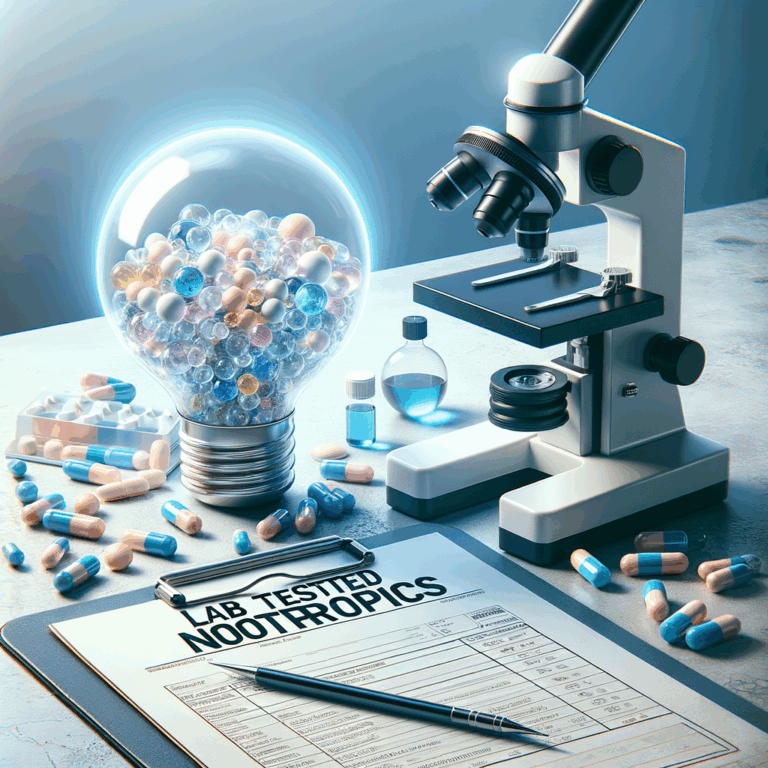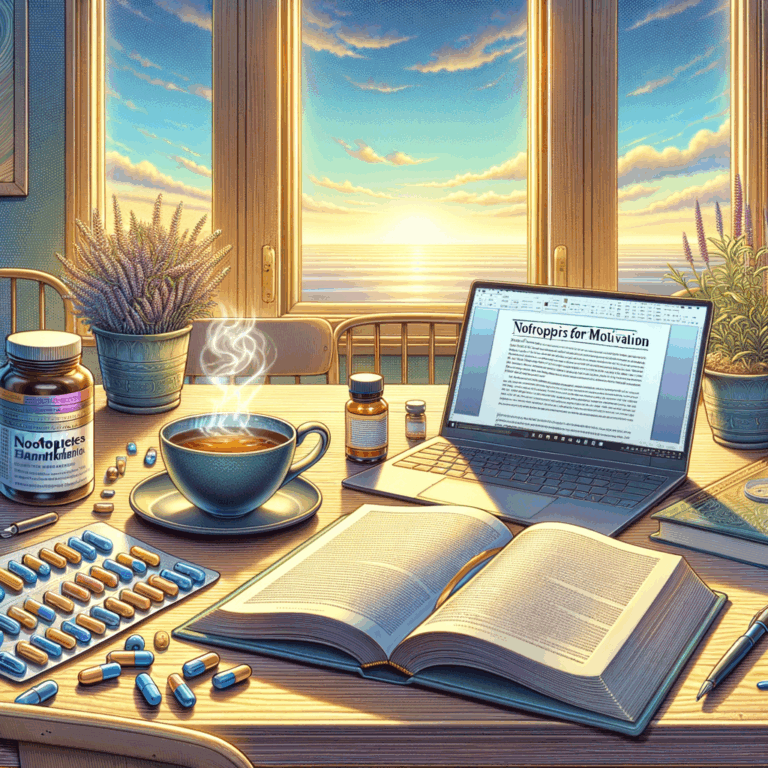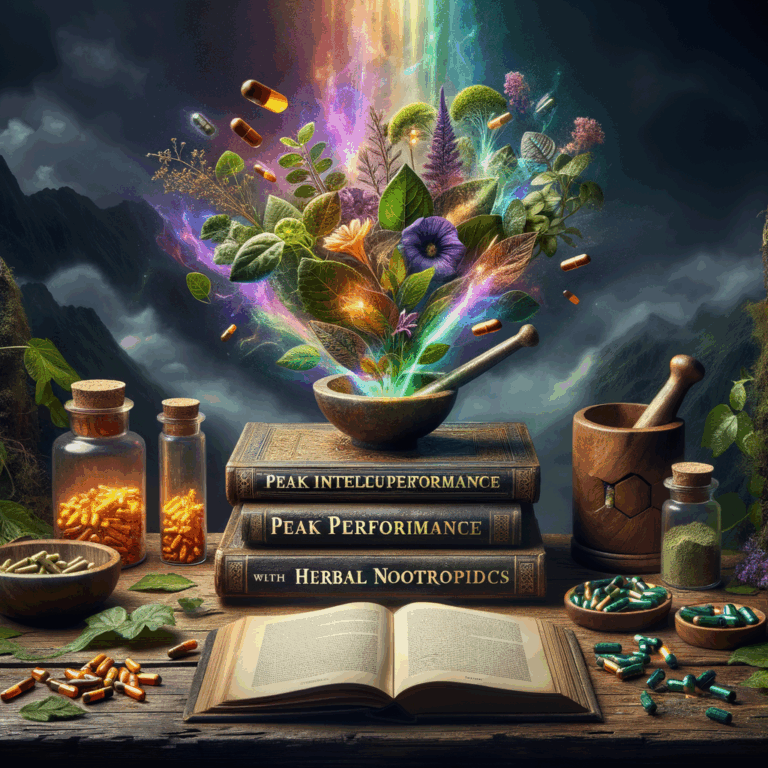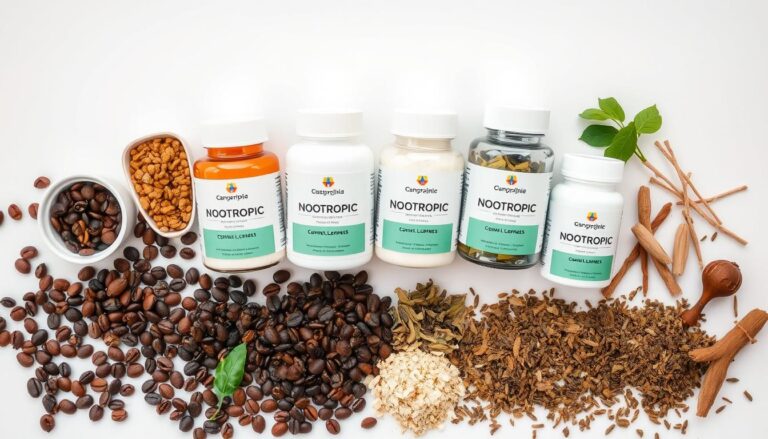- Understanding Nootropics for Energy
- What Are Nootropics?
- How Nootropics Help Improve Energy
- Popular Nootropics for Energy
- Caffeine: The Classic Choice
- L-Theanine: The Perfect Pair
- Rhodiola Rosea: The Adaptogen
- Panax Ginseng: The Ancient Secret
- Bacopa Monnieri: The Memory Booster
- Creatine: More Than Just Muscle
- Lion's Mane: The Brain Protector
- Stacking Nootropics for Maximum Benefit
- Safety and Potential Side Effects
- Nootropics and Lifestyle Factors
- The Science Behind Nootropics
- Frequently Asked Questions About Nootropics for Energy
- Conclusion
- References
Understanding Nootropics for Energy
In today’s fast-paced world, feeling low on energy can happen to anyone. You might struggle to keep your creativity alive during late-night study sessions or while tackling demanding work tasks. That’s where nootropics come in. Often called “smart drugs,” these supplements can boost cognitive functions, including memory, creativity, and overall energy levels. But how do they work, and which ones are the best for your needs? Let’s explore the fascinating world of nootropics for energy and their surprising effects on creativity.
What Are Nootropics?
Nootropics are substances aimed at enhancing brain function. They can be natural or synthetic and work by improving different cognitive abilities, such as memory, focus, and creativity. These compounds can offer a mental edge, especially when energy levels dip.
Some key characteristics of nootropics include:
– Safety: They should cause no significant side effects at recommended dosages.
– Cognitive Enhancement: They enhance learning, memory, or overall brain function.
– Neuroprotection: They may protect the brain from age-related decline.
With their growing popularity, many people are turning to nootropics to combat fatigue and enhance creativity.
How Nootropics Help Improve Energy
Nootropics for energy can increase alertness, reduce fatigue, and improve mood, making it easier to maintain focus. They often act on neurotransmitters, hormones, and other brain pathways to achieve these effects. Here are a few mechanisms through which they operate:
1. Dopamine Regulation: Certain nootropics can increase dopamine, a neurotransmitter connected to motivation and pleasure.
2. Neurotransmitter Support: Some supplements boost levels of achieving neurotransmitters like acetylcholine, important for learning and memory.
3. Circulation Improvement: A few nootropics enhance blood flow to the brain, ensuring it receives more oxygen and nutrients.
Understanding these mechanisms helps explain why many people consider nootropics a valuable tool for enhancing creativity and energy.
Popular Nootropics for Energy
Here is a list of popular nootropics renowned for their energy-boosting properties:
| Nootropic | Benefits | Potential Side Effects |
|——————-|———————————————-|————————–|
| Caffeine | Increases alertness and reduces fatigue. | Insomnia, jitters. |
| L-Theanine | Promotes relaxation while boosting focus. | Rarely, headache. |
| Rhodiola Rosea| Combats fatigue and enhances mood. | Mild digestive issues. |
| Panax Ginseng | Reduces fatigue and improves focus. | Headaches, sleep issues. |
| Bacopa Monnieri| Enhances memory and reduces anxiety. | Stomach cramps. |
| Creatine | Increases energy and cognitive function. | Weight gain, dehydration. |
| Lion’s Mane | Improves focus and memory. | Allergic reactions. |
Each of these nootropics carries its own unique benefits and side effects. It’s crucial to research and understand them before trying any new supplement.
Caffeine: The Classic Choice
Caffeine is perhaps the most well-known nootropic. Millions consume it daily through coffee, tea, or energy drinks. It works primarily by blocking adenosine receptors in the brain, which reduces the sensation of tiredness.
While it enhances alertness, the effects can vary from person to person. Some may experience jitters or anxiety, especially when consumed in large amounts. Therefore, moderation is key.
Incorporating caffeine strategically into your routine, perhaps during critical tasks, can significantly improve your focus and energy levels without overwhelming your system.
L-Theanine: The Perfect Pair
L-Theanine is an amino acid found in tea. It promotes relaxation without inducing drowsiness, making it a great partner for caffeine. When combined, they create a state of “alert calmness.” You get the best of both worlds—enhanced creativity and reduced stress.
For those who love coffee but feel anxious afterward, adding L-Theanine could balance those effects. This combination is an excellent way to maintain sustained focus, especially during brainstorming sessions or creative projects.
Rhodiola Rosea: The Adaptogen
Rhodiola Rosea is known as an adaptogen. Adaptogens help the body manage stress, and Rhodiola specifically reduces fatigue and enhances stamina. Studies show that people using Rhodiola improved their work performance and mood.
Using Rhodiola can benefit anyone facing stressful situations. It may help keep your energy high and your mind sharp, especially when juggling multiple tasks.
Panax Ginseng: The Ancient Secret
Panax Ginseng has been used in traditional medicine for centuries. Research suggests it can improve energy levels and cognitive function. Its adaptogenic properties help reduce physical and mental fatigue.
Incorporating Panax Ginseng into your routine can be particularly beneficial during long work days or intense creative projects. The energy boost it offers can be significant, making it an excellent addition to the nootropic stack.
Bacopa Monnieri: The Memory Booster
Bacopa Monnieri has gained recognition for its potential cognitive benefits. It’s known to enhance memory and reduce anxiety, which can be invaluable when trying to tap into your creative side.
Regular use of Bacopa can lead to improvements in brain function, especially in stressful environments. When your mind is calm and focused, you can think more clearly and creatively.
Creatine: More Than Just Muscle
Creatine is often associated with physical performance, but it’s also a powerful nootropic. It helps provide energy to cells, including brain cells, by supporting ATP production. Many users report increased focus and cognitive performance, especially during demanding tasks.
Including creatine in your nootropic stack will not only support your physical workouts but also help with mental stamina. This dual benefit makes creatine a versatile addition to any energy-boosting regimen.
Lion’s Mane: The Brain Protector
Lion’s Mane mushroom has gained popularity for its neuroprotective properties. It may enhance cognitive function and creativity by promoting the production of Nerve Growth Factor (NGF). NGF helps support the growth and maintenance of neurons.
Using Lion’s Mane can open a world of mental clarity and creative ideas. Many find it especially beneficial during brainstorming sessions or when tasked with problem-solving.
Stacking Nootropics for Maximum Benefit
Many users opt to combine different nootropics for enhanced effects. For example, pairing caffeine with L-Theanine creates a smooth boost of energy without the jitters. You can also combine Rhodiola Rosea with Panax Ginseng to tackle fatigue while enhancing focus.
Here’s a simple nootropic stack for energy and creativity:
1. Caffeine (100-200mg)
2. L-Theanine (200mg)
3. Rhodiola Rosea (200-400mg)
4. Bacopa Monnieri (300mg)
Note: Always start with lower doses to gauge your body’s reaction. Consult with a healthcare professional if you are unsure.
Safety and Potential Side Effects
While many nootropics are generally safe, some users may experience side effects. These can include headaches, digestive issues, or anxiety, depending on the individual and the specific nootropic.
To minimize adverse effects, start with small doses and gradually increase them. Always choose reputable brands that provide third-party testing. This ensures you’re taking a product free from harmful contaminants.
Nootropics and Lifestyle Factors
While nootropics can improve energy and creativity, they work best when combined with good lifestyle choices. Here are some excellent habits to complement your nootropic use:
– Sleep: Prioritize quality sleep to enhance cognitive function.
– Nutrition: A balanced diet rich in omega-3 fatty acids supports brain health.
– Exercise: Regular physical activity increases blood flow to the brain and improves mood.
– Hydration: Staying hydrated is crucial for maintaining energy levels and focus.
The Science Behind Nootropics
Understanding the science behind nootropics helps clarify their role in enhancing energy and creativity. Many studies have focused on how these substances impact neurotransmitters, brain plasticity, and overall cognitive function.
For example, research shows that L-Theanine can promote relaxation by increasing alpha brain waves. Meanwhile, Rhodiola’s adaptogenic effects help decrease fatigue by balancing cortisol levels during stress.
Further exploration of these mechanisms can unveil even more benefits, reinforcing the status of nootropics in cognitive enhancement.
Frequently Asked Questions About Nootropics for Energy
1. Are nootropics safe for everyone?
Generally, nootropics are safe for most people. However, always consult with a healthcare professional, especially if you take medications or have health conditions.
2. How long does it take to feel the effects?
Effects can vary but typically may be felt within 30 minutes to a few hours, depending on the nootropic and the individual.
3. Can nootropics replace sleep?
No, nootropics can enhance alertness but should not replace quality sleep. Sleep is essential for cognitive health.
4. How should I start with nootropics?
Begin with a single nootropic at a low dose to gauge your body’s reaction before combining them.
5. Can I take nootropics every day?
Many users take nootropics daily, but some may require breaks. Monitor your body’s response and consult a healthcare professional for personal advice.
6. What’s the best time to take nootropics?
The best timing varies by individual and nootropic. Some prefer morning use for daily tasks, while others may find evening use more beneficial for focus.
7. Can I still drink coffee while on nootropics?
Yes, but be cautious of caffeine overload. Combining stimulating nootropics with caffeine can lead to jitters.
8. Are there any natural nootropic foods?
Yes, foods like blueberries, green tea, and dark chocolate have natural nootropic properties.
9. How do I choose the right nootropic for my needs?
Identify your goals—whether it’s boosting energy, improving memory, or enhancing creativity—and choose a nootropic based on those needs.
10. Are nootropics addictive?
Most nootropics are not considered addictive, but caution is advised. Monitor your intake and avoid dependency on any substance.
Conclusion
Nootropics for energy offer exciting potential for enhancing creativity and focus. By understanding different compounds, you can choose the right ones for your needs. Remember that nootropics work best alongside healthy lifestyle choices to achieve your optimal performance.
As you explore these cognitive enhancers, approach them with care and respect. With the right knowledge and guidance, you can unlock new levels of energy and creativity in your daily life.
References
1. WebMD – Nootropics: Benefits and Risks
2. Healthline – The Best Nootropics for Energy
3. Verywell Fit – The Science Behind Nootropics
4. Examine.com – Nootropics for Cognitive Enhancement



